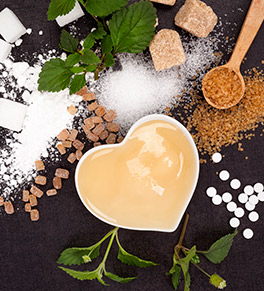Sugar substitutes linked to heart disease, stroke risk

Artificial sweeteners — long a staple in soft drinks and myriad foods to lower the calorie count and reduce health risks associated with real sugar — now appear to present their own hazards and their use should be reconsidered, say UCI Health cardiologists.
A study published this month in BMJ, the British Medical Journal, reported that people who consumed significant amounts of artificial sweeteners had an 18% higher risk for stroke and cerebrovascular incidents, and a 9% increase in risk for cardiovascular disease.
The observational nutrition study did not establish a causal link between artificial sweeteners, heart disease and cerebrovascular incidents. Nonetheless, the researchers concluded that alternative sweeteners "should not be considered a healthy and safe alternative to sugar."
Reconsidering sugar substitutes
Eating too much sugar can lead to high blood pressure, inflammation, weight gain, diabetes and fatty liver disease, all of which are linked to a higher risk for stroke and heart disease.
Given the cardiovascular events reported among study participants, "it appears wise to limit the use of artificial sweeteners," says Dr. Elizabeth H. Dineen, an integrative cardiologist with the UCI Health Susan Samueli Integrative Health Institute.
"These findings can help open a dialogue with patients about their dietary consumption of sugars, as well as artificial sweeteners, and their associated risk for coronary heart disease and cerebrovascular events," adds Dr. Ailin Barseghian El-Farra, who also is an integrative cardiologist with the institute. Neither physician participated in the study.
The NutriNet-Santé study followed more than 100,000 French adults for about nine years. Their average age at the start was 42 and almost 80% of participants were women. All were asked to provide details about their diet, health, physical activity, education, smoking status and occupation.
Every six months, they reported all food and beverages consumed within a 24-hour period. This gave researchers a detailed summary of their total consumption of artificial sweeteners plus their intake of other food and nutrients, including fruit, vegetables, dairy products and meat.
Tracking sweetener consumption
The study found that 37% of participants consumed some form of artificial sweetener, averaging about 42 milligrams a day, which equals the amount in a packet of sweetener or 3.4 ounces of diet soda. Among participants who consumed greater amounts of artificial sweeteners, the average was nearly double at 78 milligrams a day, the equivalent of about 7 ounces of diet soda.
Those whose intake of artificial sweeteners was greatest were younger overall, had a higher body mass index (BMI), were more likely to smoke, be less physically active and didn't follow a weight-control diet. Curiously, they took in fewer calories, consumed less alcohol, less saturated and polyunsaturated fats, fiber, carbohydrates, fruit and vegetables. But they had a higher intake of sodium, red and processed meats as well as dairy products.
Researchers also tracked participants' health, including medical exams, treatments and cardiovascular incidents such as heart disease, heart attacks and strokes.
After accounting for differences in age, sex, physical activity, education, smoking and family history of heart disease, researchers determined that people who consumed the most artificial sweeteners — especially aspartame, acesulfame potassium and sucralose — had a 9% higher risk for cardiovascular disease and an 18% greater risk for stroke or other cerebrovascular disease when compared with participants who ate none.
Another study published by the same authors last spring in PLoS ONE reported that higher consumption of artificial sweeteners, especially aspartame and acesulfame-K, was also associated with an elevated risk for cancer.
Changing dietary behaviors
The message is clear: "Avoiding added artificial sugars makes sense, and this study helps to support that," says Dineen, an assistant professor of cardiology at the UCI School of Medicine.
“It is really important for all individuals to minimize their risk of cardiovascular disease by following preventive strategies — such as dietary interventions. Certainly if cardiovascular disease is already diagnosed, then these preventive efforts are of utmost importance.”
She recommends a Mediterranean diet — rich in fruits, vegetables, whole grains and healthy fats. While the traditional Mediterranean diet emphasizes fish and seafood, it can be tailored to a person’s personal preferences and health concerns. "The more natural and less processed food you eat, the better."
The NutriNet-Santé study is unique in its focus on specific artificial sweeteners rather than beverages, allowing for less confounding variables, says Barseghian, an associate professor of cardiology at the UCI School of Medicine. "It found that aspartame is associated with higher risk of cerebrovascular events (strokes) and acesulfame potassium and sucralose were associated with increased coronary heart disease risk."
The study can be an effective resource for health providers, she adds. "Hopefully we can change the behavior of consumers around consumption of artificial sweeteners."
Related Stories
Explore further
Browse more blog posts by topic.




